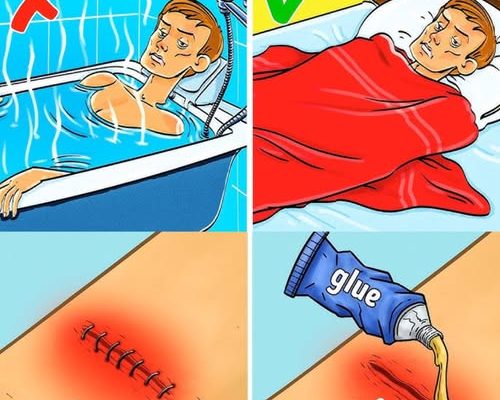Emergencies can strike at any time, and knowing the right life hacks can make a crucial difference. Many commonly recommended tips may seem helpful but can sometimes do more harm than good. Here, we share 12 life-saving strategies that can help you handle unexpected situations safely and effectively.
1. What to Do If You Get Something in Your Eye
If a small object, like an eyelash, enters your eye, wash your hands first and let your natural tears flush it out. Use a damp cloth to remove it gently if needed. However, if you get a more dangerous object, like glass, do not attempt to remove it yourself. Seek immediate medical attention instead.
2. Treating Wounds Correctly
Applying ointment to a fresh wound can trap unwanted moisture, creating a breeding ground for bacteria. Instead, clean the wound with cool water and soap, then apply a dry bandage to promote faster healing.
3. Avoid Rubbing Alcohol or Vinegar on a Fevered Person
Many people believe rubbing alcohol or vinegar on the skin helps reduce fever, but this can be dangerous. The skin absorbs these substances, which can lead to intoxication-like symptoms. Instead, stay hydrated with water and herbal teas, and maintain a cool room temperature of 61-64°F (16-18°C) to help manage fever symptoms naturally.
4. How to Properly Handle a Fainting Person
If someone faints, do not lift them up or sprinkle water on them. Instead, elevate their legs, loosen any tight clothing, and wait for them to regain consciousness. Avoid giving them coffee or energy drinks, as caffeine can lead to dehydration.
5. The Truth About Treating Burns
Applying butter or sour cream to burns may feel soothing, but it actually traps heat inside the skin, worsening the damage. Instead, run cool water over the burn for 15 minutes. If blisters form, do not pop them, as they protect against infection.
6. Do Not Try to Reset a Dislocated Joint
Trying to reset a dislocated joint without professional help can cause more damage. Instead, immobilize the injured limb in a comfortable position and seek immediate medical assistance.
7. Poisoning: Avoid Inducing Vomiting
If someone has ingested poison, do not induce vomiting. This can cause the substance to enter the lungs and lead to more severe complications. Instead, call emergency services immediately for proper medical advice.
8. Safe Rescue Techniques for Drowning Victims
When rescuing a drowning person, always approach them from behind and hold them under the armpits or chin while bringing them to safety. This prevents the person from grabbing onto you in panic, which could put both of you in danger.
9. Do Not Remove Objects Stuck in Serious Wounds
If a foreign object is deeply lodged in a wound, do not attempt to remove it yourself, as this can cause further bleeding and damage. Instead, secure the object in place with a bandage and seek professional medical help immediately.
10. How to Safely Apply Ice to a Bruise
Applying ice directly to a bruise can cause skin damage. Always wrap ice in a cloth before applying it to the affected area. Limit the application to 20 minutes at a time to reduce swelling effectively.
11. Keeping Fractures Stable
If you suspect a fracture, immobilize both the injury site and the surrounding joints using a bandage or makeshift splint. Avoid unnecessary movement and seek medical assistance promptly.
12. Do Not Apply Heat to a Sprain
Applying heat to a sprain can worsen inflammation. Instead, use a cold compress to reduce swelling and pain. Follow the RICE method (Rest, Ice, Compression, Elevation) for effective recovery.
Final Thoughts
Knowing what to do in an emergency can make all the difference. By avoiding common misconceptions and following these life-saving tips, you can respond more effectively to unexpected situations. Stay prepared, stay safe, and always seek professional medical assistance when needed.


